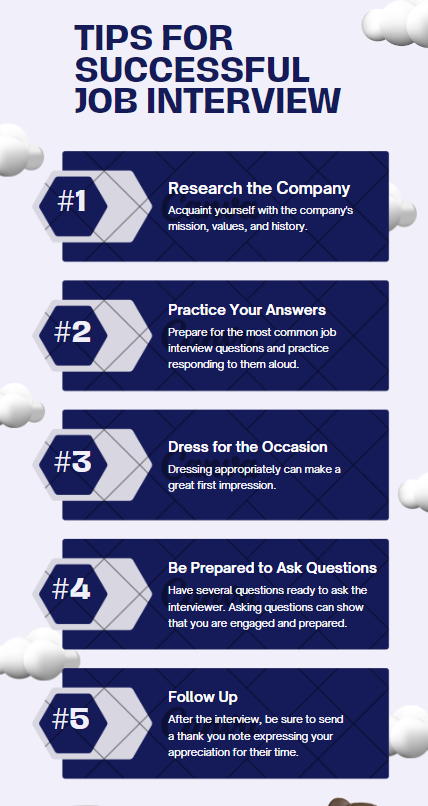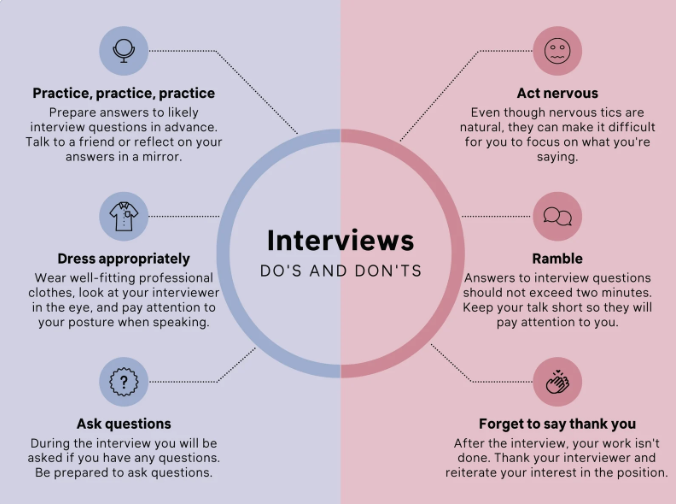Artificial Intelligence (AI) is revolutionizing industries worldwide. From automating routine tasks to enabling self-driving cars and intelligent healthcare diagnostics, AI is reshaping the future of work. For college students and…

10 Essential Tips to Ace Your First Job Interview
It may be both exhilarating and overwhelming to enter the professional world, especially for new graduates getting ready for their first job interview. It’s normal to feel anxious, but you may greatly improve your odds of success with careful planning and a good outlook.

The following article will offer freshers helpful advice on how to ace their first job interview and secure the desired job opportunities.
How to Nail Your First Job Interview? – Best 10 Tips
Congratulations on landing your first job interview! Making a solid first impression is crucial because this is a significant professional move. Here are some pointers to help you succeed in your first job interview:
Research About the Company
It’s necessary to do extensive research about the organization you’re applying to before attending the interview round. To understand their beliefs, mission, products/services, and business culture, evaluate their website, social media presence, and recent news items. The company’s website, social media profiles, and Ambition Box/Glassdoor reviews, all have this information available.
Analyze the Job Description
To determine the essential abilities and credentials the employer is looking for, carefully examine the job description. Make a list of the pertinent tasks, assignments, or coursework you have performed that directly relates to these demands. This will help you convey during the interview your suitability for the position.
Practice Common Interview Questions
While you can’t predict every question that will be asked during an interview, practicing common interview questions will help you feel more confident and articulate in your responses. Prepare concise and specific answers. Some common interview questions include:
- Tell me about yourself.
- Why do you want this job?
- What are your strengths and weaknesses?
- What are your salary expectations?
- Where do you see yourself in 5 years?
- Why should we hire you?
Dress Professionally
Presenting a professional image when attending an interview is crucial because first impressions count. Consider dressing one step above the company’s dress code. Pick a conservative outfit that fits well and conveys your respect for the situation while also reflecting your professionalism.
Be Punctual
Being punctual for your interview demonstrates your dependability and responsibility. Be at the interview location at least 15 minutes early to give yourself time to settle in, gather your thoughts, and finish any documentation that needs to be done.
Organize Your Documents
Make sure you have all the necessary paperwork organized and prepared to present. This could contain copies of your résumé, cover letter, references, transcripts from any relevant academic work, certifications, and other pertinent paperwork. Having these ready indicates your professionalism and attention to detail.
Showcase Your Soft Skills
Employers place high importance on soft skills like teamwork, communication, versatility, and problem-solving, in addition to technical skills. Be prepared to give instances of when you have used these abilities successfully. Refer to your past experiences in relation to the demands of the position, and emphasize your capacity for teamwork.
Be Yourself
The most crucial thing is to be genuine while giving the interview. Try not to pretend to be someone you are not since the interviewer can tell. Simply exude confidence and let your individuality shine.
Ask Relevant Questions to the Interviewer
The interviewer will probably ask if you have any final questions before ending the session. To show that you are interested and engaged, get ready in advance with a few smart and relevant questions. Ask about the company’s long-term goals, expansion potential, or team dynamics. This demonstrates your initiative and your interest in the position.
Follow-up After the Interview
Send a personalized thank you email to the interviewer after the interview to show your appreciation for the chance. Mention a crucial point brought up during the interview and keep it concise and professional. With this action, you demonstrate your professionalism and hold the interviewer’s attention. A follow-up after the interview is important!
What to Wear to Your First Job Interview?
What you wear to your first job interview is an essential aspect of making a positive first impression. Dressing appropriately and professionally can help demonstrate your seriousness and suitability for the role. Here are some guidelines on what to wear:
- Research the Company Culture: Before the interview, research the company’s dress code and culture. Some organizations have a formal dress code, while others are more casual. Tailor your attire accordingly.
- Business Professional: In most cases, it’s safest to wear business professional attire, especially if you’re uncertain about the company’s dress code. For men, this typically means a well-fitted suit in a conservative color (e.g., navy, charcoal, black) with a dress shirt, tie, and polished dress shoes. For women, business professional attire includes a tailored pantsuit or skirt suit with a blouse, closed-toe heels, and minimal accessories.
- Conservative Colors: Choose conservative colors for your interview attire. Neutral colors like black, gray, navy, and white are safe choices. Avoid overly bright or flashy colors that might distract from your qualifications.
- Grooming and Personal Hygiene: Ensure that you are well-groomed and maintain personal hygiene. Cleanliness and tidiness contribute to a professional appearance. Pay attention to details like neatly trimmed nails and clean, polished shoes.
- Minimal Accessories: Keep accessories simple and understated. Avoid excessive jewelry, and opt for a conservative watch if you wear one. Remove facial piercings, if applicable.
- Conservative Hairstyles: Maintain a conservative and well-groomed hairstyle. Ensure your hair is clean and neatly styled.
- Personal Style: While professionalism is key, it’s also essential to feel comfortable in what you’re wearing. Choose attire that aligns with your personal style within the boundaries of professionalism.
- Comfortable Shoes: Choose comfortable, closed-toe shoes that you can walk in comfortably. Make sure they are clean and polished.
Additional Tips for Freshers to Ace Their First Interview
You’ll succeed in your first job interview if you follow the advice given above. Just keep in mind to be yourself, confident, and prepared, and you’ll be in the right position. For freshers, the following additional advice can be useful:
- Be specific about your job aspirations. What do you hope to accomplish professionally? What are your short- and long-term objectives?
- Be passionate about the job. Why do you desire this position? What about the position appeals to you the most?
- Be ready to discuss your qualifications and experience in response to inquiries. What are your advantages and disadvantages? What achievements do you have?
- Be able to discuss your principles and work ethics. What are your main concerns? What kind of workplace thrives on you?
- Inquire about the business and the position. This demonstrates your interest in the opportunity and investigation into it.
- Be enthusiastic and optimistic during the entire interview. Doing this will enhance your first impression and make the interviewer want to learn more about you.
Why are First Impressions so Important in Job Interview?
First impressions are incredibly important in job interviews for several key reasons:
- Lasting Impact: First impressions tend to be enduring. Once an interviewer forms an initial opinion of you, it can be challenging to change that perception, even if you perform well later in the interview.
- Quick Assessment: Interviewers often have limited time to assess candidates. They must make rapid judgments based on initial interactions. Your first impression provides the foundation for these judgments.
- Positive Bias: A positive first impression can lead the interviewer to view your subsequent responses and actions in a more favorable light. Conversely, a negative first impression can lead to skepticism about your qualifications.
- Cultural Fit: Interviewers often consider how well you would fit into the company’s culture. A strong first impression can signal that you’ll be a good fit, while a poor one may raise concerns about your compatibility.
- Confidence and Competence: A polished and confident first impression suggests that you are well-prepared, capable, and professional. This can instill confidence in the interviewer about your abilities.
- Attention to Detail: Your appearance, punctuality, and manners during the first meeting convey your attention to detail and professionalism, which are highly valued traits in the workplace.
- Decision-Making: In many cases, interviewers use first impressions as a basis for deciding which candidates to delve deeper into during the interview process. A strong first impression can secure your spot for further consideration.
- Setting the Tone: Your initial greeting and demeanor help set the tone for the interview. A friendly and engaging first impression can create a positive atmosphere that facilitates effective communication.
- Competitive Advantage: In competitive job markets, where multiple qualified candidates may be vying for the same position, a strong first impression can give you a competitive advantage.
- Personal Connection: Building a positive rapport from the start can make the interviewer more inclined to see you as a potential colleague rather than just another candidate.

7 Tips For Freshers to Ace an Interview For Job
Freshers can ace a job interview by following these 7 tips:
- Research the company to understand its values and goals.
- Understand the job role and align your skills with its requirements.
- Practice common questions to build confidence.
- Highlight technical and soft skills with examples from internships or projects.
- Dress professionally to make a great first impression.
- Ask thoughtful questions about the role or company.
- Stay calm and confident during the interview.
It can be difficult to land your first job, but with the right preparation and confidence, you can dazzle hiring managers at the first job interview. Do study up on the business, acquaint yourself with the job description, dress properly, and come early. Practice your responses, pay attention to nonverbal cues, and highlight your soft skills. Last but not least, to make a good and long-lasting impression, ask pertinent questions and send a thank-you note afterward. You’ll be well on your way to acing your first job interview and positioning yourself for career success by paying attention to these tips.
Read more:
- Develop New Skills for Freshers with Free Online Courses
- Highlighting Technical Skills on a Fresher’s Resume
- Dress Code for Interviews
- Essential Workplace Etiquettes
- Interview questions for part-time and WFH Jobs
- Common Behavioral Questions for Freshers
If you are a fresher looking for a job, we encourage you to use Firstnaukri’s resume maker service. It is a free and easy way to create a resume that will help you land your dream job.
FAQs on Tips for Freshers to Ace Their First Job Interview
How should I dress for a job interview as a fresher?
Dress professionally by deciding on an attire that fits properly and conveys your respect for the chance and professionalism.
How can I prepare for common interview questions?
Practice common interview questions, and craft concise and specific answers that highlight your skills, achievements, and problem-solving abilities.
What are the 5 questions asked in an interview for freshers?
The top 5 questions asked in an interview for freshers are:
- Why should we hire you?
- What are your salary expectations?
- Why are you interested in this position?
- Tell me about yourself.
- What are your strengths and weaknesses?
Is it important to follow up after the interview?
In order to show your appreciation and maintain your name in the interviewer’s memory while demonstrating your professionalism and enthusiasm in the position, you should send a personalized thank you note or email after the interview.
Latest Posts
How to Write a Leave Letter (Format & Examples)
In today’s fast-paced academic and professional environments, there may come a time when you need to take a leave of absence. Writing a leave letter is an essential skill that…
How to Write a Job Application Letter (With Samples)
When it comes to applying for your first job, making a great first impression is crucial. As a recent graduate, you might feel a little intimidated by the idea of…
Data Science vs Data Analytics – Everything You Need to Know!
In today’s digital economy, Data Science and Data Analytics have become some of the most sought-after career paths for students and freshers, especially in India. With businesses increasingly relying on…
How to Land Your Dream Job: Job Search Guide for Beginners
In today’s competitive job market, securing your dream job requires more than just a polished resume and a strong cover letter. It demands a strategic approach and a deep understanding…
Popular Posts
100+ Quantitative Aptitude Questions for Placement with Answers
Quantitative aptitude questions play a crucial role in campus placements, competitive exams, and entry-level job interviews. Whether you are preparing for your first job interview, an aptitude test for placement,…
How to Write Mail for Job Application – Explained
A job application email is a professional email that you send to a potential employer to express your interest in a job opening. It is typically accompanied by your resume…
How to Start an AI Career in India: Skills and Future of Work
Artificial Intelligence (AI) is revolutionizing industries worldwide. From automating routine tasks to enabling self-driving cars and intelligent healthcare diagnostics, AI is reshaping the future of work. For college students and…
Google Internship 2026 for Freshers: All You Need to Know
In the competitive landscape of technology careers, a Google internship stands out as a golden opportunity for aspiring professionals. Whether a college student or a recent graduate, securing an internship…
How to Write a Job Application Letter (With Samples)
When it comes to applying for your first job, making a great first impression is crucial. As a recent graduate, you might feel a little intimidated by the idea of…
